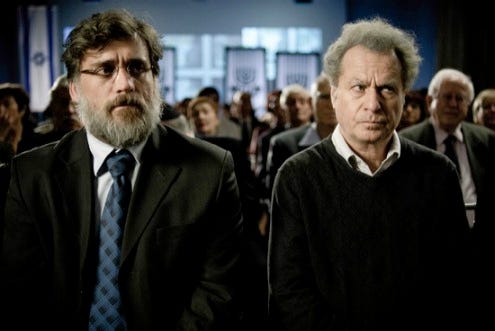Footnote

If there were such a thing as an Israeli Coen Brothers movie, "Footnote" would be that film. It boasts all the quirks evident in their style of filmmaking, but it's still unique enough to exhibit director Joseph Cedar's personality as well.
The story is simple enough, involving a father/son duo on polar-opposite trajectories in life. Uriel Shkolnik is an up-and-coming philologist who doubles as a professor and member of the Israel Academy of Sciences and Humanities. His work is widely celebrated by his colleagues and the general public alike. Seemingly everyone acknowledges Uriel's greatness — except his own father, Eliezer Shkolnik. Eliezer is, for lack of a better term, a has-been who dedicated 30 years of his life to a thesis ultimately founded and published by a colleague of his, completely discrediting all of Elierzer's hard work. Essentially, his life's work has been reduced to a mere footnote in history rather than an award-winning career. He's an obstinate research purist who has been all but forgotten over time.
The plot thickens, however, with the introduction of the Israel Prize, an annual award that symbolizes the country's highest honors (best equated to America's Pulitzer Prize). The prize is supposed to go to Uriel, but thanks to a mistake on the part of the Minister of Education, it's announced that the award has gone to Eliezer. Unbeknownst to basically everyone, Uriel unselfishly gives up the prize for his father, keeping the egregious error to himself. What follows is a series of brilliant back-and-forths between father and son.
In its second act, "Footnote" becomes overtly cunning and cerebral in nature. What starts out as an understated comedy of sorts turns into an intense drama ripe with scene after scene of powerful imagery and pure character development.
"Footnote" is, quite simply, a joy to watch. The most powerful element in the film is its approach to human nature. It's incredibly heartfelt and, moreover, authentic in its conception of human interaction. The main characters in "Footnote" are so highly developed that viewers can't help but have a vested interest in the plot. Given the story's simplicity, the punch this film packs is a surprise. However, the story's singular note is what makes its unfolding so enjoyable. It's not convoluted, it's not pretentious, it's not experimental in nature. The end result is an elaborate tapestry of guilt, jealousy and honor all wrapped up and spun into a masterful story.
At its core, "Footnote" is basic storytelling that elicits universal themes which transcend language and culture. Despite being a Hebrew-language film, the overall tone feels very much American. The film is uncompromising, even when the exploration of the father/son relationship becomes strained and awkward. Prepare to feel a great deal of unease because the film is unrelenting right to the very end — a conclusion that is, in fact, brilliantly maneuvered. Frankly, I was thrilled from the quirky introduction to the triumphant climax. "Footnote" truly is one of the best foreign dramas I have ever had the pleasure of seeing.
